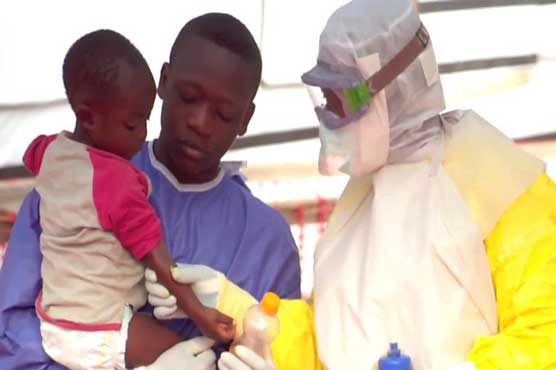Ebola: Four dead after new outbreak in Congo

Governor calls for calm and advises people not to �touch ill or dead people who had a fever or bleed
CONGO (Web Desk) - Four people have died from Ebola in a new outbreak in the Democratic Republic of Congo, the country’s health ministry confirmed on Monday.
It comes as Health Minister Eteni Longondo confirmed a new case of the deadly virus in the western province of Equateur, over 1,000km (620 miles) away from the ongoing outbreak in the country’s east.
The governor of the Equateur province, Bobo Boloko Bolumbu also confirmed the deaths on local radio, reported The Telegraph. He said: “The laboratory has given us the information that all the deaths analysed since the 18th of May are a consequence of the Ebola virus. However, for precision, the samples have been sent to the INRB for quality control.
“I ask the population to be calm and continue to respect hygiene measures. Regularly wash your hands with soap. Don’t say greet with your hands. Don’t touch ill or dead people who had a fever or bleeding,” he added.
The new outbreak presents a fresh challenge to health authorities. In April, the World Health Organisation was just days away from declaring the second-largest Ebola epidemic on record had come to an end when a new cluster of infections was confirmed in the east.
The last time the Equateur region saw cases of Ebola emerge was May 2018, when the outbreak began in the rural area of Bikoro and spread to the city of Mbandaka.
Health authorities there responded swiftly and the outbreak in the region was declared over by August with a total of 53 infections and 29 deaths.
However, the country is facing a major challenge as it fights to deal with the new outbreaks, as well as coronavirus and measles.
According to the WHO, the DRC’s Ministry of Health began the 42-day countdown to the declaration of the end of the outbreak.Skip in 5
But the organisation warned the “long duration and large magnitude of this outbreak” as well as the virus’ presence in animal reservoirs in the region could mean a re-emergence of the virus “leading up to, and beyond, the declaration of the end of the outbreak”.
“It is crucial to maintain a strong and robust surveillance system in order to detect, isolate, test and treat new suspected cases as early as possible and to break possible chains of transmission,” said the WHO in an update on the outbreak on 28 May.

